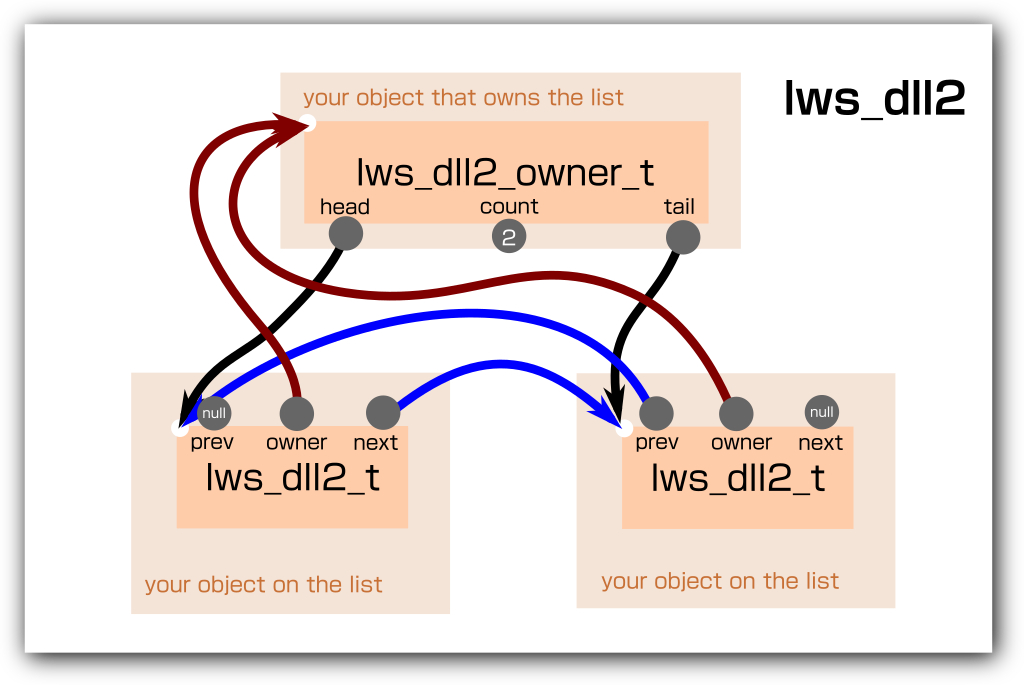Libwebsockets lws_dll2
Overview
- CMake options: part of core lws
- Public header: (included by libwebsockets.h) include/libwebsockets/lws-dll2.h
- Implementation: lib/core/lws-dll2.c
lws_dll2 is a smart doubly-linked list that simplifies lists while remaining without implementation restrictions or bloat.
lws_dll2 is used throughout lws and is a public export for a few versions now. It’s mature, flexible, robust and leads to restriction-free, readable and maintainable code. And it’s more featureful than generic linked-list abstractions.
Basic approach

There are two objects involved, a singular lws_dll2_owner_t and
in every object that will join the list, a lws_dll2_t. This provides some
useful characteristics:
you compose
lws_dll2_owner_tandlws_dll2_tobjects into your objects that own and participate in lists. The lws_dll2 apis take care of maintaining all the relationships between objects.all
lws_dll2...objects themselves point tolws_dll2...objects, not your objects you composed them into. You can recover your object pointer usinglws_container_of()explained belowyour objects can exist on multiple lists with different owners, you need one
lws_dll2_tin your object per list it will participate onlws_dll2_objects can go anywhere in your struct, they don’t have to go at the start or anything like thatyou must remove your object from any lists it is on before destroying it
you can remove an
lws_dll2_tfrom its owner without having to track or know who the owner is. Objects that may belong to different owners (eg, pending and done lists) are simple to implement.if your object is on an list owner in another object, you can always recover a pointer to the owning object for free
lws_dll2 common Apis
| api | description |
|---|---|
| lws_dll2_add_head(lws_dll2_t d, lws_dll2_owner_t owner) | insert at start of owner list |
| lws_dll2_add_tail(lws_dll2_t d, lws_dll2_owner_t owner) | insert at end of owner list |
| lws_dll2_remove(lws_dll2_t *d) | remove from owner list |
| lws_dll2_get_head(lws_dll2_t *d) | get pointer to first object’s lws_dll2_t on list |
| lws_dll2_get_tail(lws_dll2_t *d) | get pointer to last object’s lws_dll2_t on list |
| lws_dll2_foreach_safe(lws_dll2_owner_t owner, void user, int (cb)(struct lws_dll2 d, void *user)) | Callback for each entry on owner’s list |
| lws_dll2_add_sorted(lws_dll2_t d, lws_dll2_owner_t own, int (compare)(const lws_dll2_t d, const lws_dll2_t *i)) | Use compare to figure out where to insert object into owner’s list |
Example
Say you have your own struct already that you want to “own” a list, you just
need to embed an lws_dll2_owner_t member in it.
struct mystruct {
...
lws_dll2_owner_t mylistowner;
...
};
you can have n of those and there’s no requirements about where they go in the struct.
Then in the struct type that will appear on an lws_dll2 list
struct myitems {
...
lws_dll2_t list;
...
}
Again you can have n of these, ie, an object can appear on multiple lws_dll2_
lists, so long as there is a different lws_dll2_t per list it’s on, and no
ordering requirement.
No init is required to use the list objects except the should be zeroed-down
from the start… you can explicitly ensure this by using lws_dll2_clear()
and lws_dll2_owner_clear() if necessary.
To add to the list
struct mystruct *mystruct;
struct myitems *myitem;
myitem = zalloc(sizeof(*myitem));
if (!myitem)
return 1;
lws_dll2_add_tail(&myitem->list, &mystruct->mylistowner);
To walk the items on the list (using a callback)
static int
my_cb(lws_dll2_t *p, void *user)
{
struct myitems *myitem = lws_container_of(o, struct myitems, list);
...
return 0;
}
...
lws_dll2_foreach_safe(mystruct->mylistowner, somepointer, mycb);
This calls back mycb with a pointer to every struct myitem on the list…
somepointer is passed to the callback’s user parameter, it can be NULL or
something of interest to the callback.
Notice that inside the callback, the pointer to .list used by lws_dll2 is
converted back into a pointer to the struct myitems that contains the list,
where it can be used as normal.
The _safe in lws_dll2_foreach_safe() refers to it being safe to remove the
object from the owner during the callback (and, if desired, destroy it), without
disturbing the list walk action.
In the case you want to walk the list inline, there’s a slighly more complex way using a helper, it looks like
lws_start_foreach_dll_safe(struct lws_dll2 *, p, p1, mystruct->listowner.head)
struct myitems *myitem = lws_container_of(p, struct myitems, list);
...
lws_end_foreach_dll_safe(p, p1)
the functionality is the same as lws_dll2_foreach_safe() but you may find it
more convenient to access local vars that are in scope without passing them
into a callback. p and p1 are arbitrary temp symbols that should not conflict
with anything already in scope and do not need additional init or declaration.
Sorted insertion
Although it’s done linearly, under some conditions the lws_dll2_add_sorted()
may save you a lot of difficulty, it scans the existing list from the head
forward calling a provided callback to determine if the new item should be
inserted there… how it assesses the sorting order is arbitrary and is up to
the callback you provide… it could compare strings in the objects, or numbers
or some more complex function.
What did we learn this time?
linked-lists are highly desirable abstractions because they don’t waste unused space and suffer from limits of preallocated arrays.
lws_dll2offers bidi lists and a single object can appear on multiple lists.Objects know which list their
lws_dll2is on and how many items are on a list cheaplyWalking lists and recovering object pointers is cheap
Sorted link-list insertion with user-defined comparison callback is supported.
